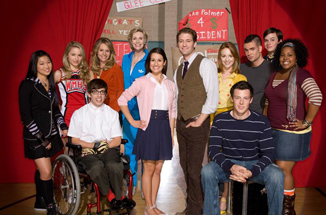Mythology: Glee
By Martin Felipe
September 17, 2009
BoxOfficeProphets.com

Now if you look at the so-called theatrical musical comeback, you'll see a few hits (Chicago, Hairspray, Mamma Mia!), a few mid-levels (Sweeney Todd, Phantom of the Opera, Moulin Rouge!) and a couple of bombs (The Producers, Rent). Thing is, the musical is a very polarizing genre. Some people embrace musicals with a passion, while others just can't seem to roll with the fantasy of characters breaking into song and dance. So there needs to be some hook to lure audiences beyond the devoted, hooks such as Oscar nominations, star turns, or recognizable music.
I will admit, I enjoy musicals. I don't know how I could argue the vicissitudes of vampire slayers, smoke monsters and alien bounty hunters while dismissing as frivolous and unbelievable impromptu musical numbers, all characters knowing the words and the moves for some reason. This is a conceit that many Hollywooders feel that audiences once accepted in the musical's heyday, but would now reject as ludicrous. Rob Marshall, when adapting Chicago for the screen, addresses this issue by providing a dream world for our lead Roxy. All the numbers happen on either an actual stage, or in her imagination. Glee has such an explanation built into the very premise of the show; our heroes are members of a high school glee club. In the more traditional musical model, the songs further the plot, reflect themes, or reveal characters' inner feelings and conflicts. Though in Glee, the numbers are inter-textual performances, they serve the same purpose. For instance, when our club performs Salt N Peppa's "Push It", the performance covers all three bases. It reflects the sexual tension between leads Rachel and Finn, it illustrates the episode's theme of teen sexual awakening, and it advances the story of the club's rebellion against their director Will.
Another way Glee plays the form to its advantage is by taking a page from the Moulin Rouge!/Mamma Mia! playbook and using familiar tunes, songs with which the audience has already formed an identification and an affection. It's easier to accept a musical when we hear songs we already know and like, songs such as Gold Digger, Wishin' and Hopin', Rehab, Don't Stop Believing, Single Ladies, Le Freak, and so on. In fact, the technique seems to be working, as many of the Glee versions of the songs are reportedly doing some decent business on iTunes.
Some of the other qualities of musicals that inspire either love or derision are on display in Glee as well. Musicals have the tendency to reduce a complex theme to a very black and white dichotomy, a recent example being that of race relations in Hairspray. Glee takes on the good old high school clique theme and reduces it pretty much down to jocks vs. nerds. Of course, the show is young, and who knows how complicated the show's take on this will become, but for now, the most challenging Glee gets is by having Finn be a part of both worlds, a jock who sings with the nerds. Hardly cutting edge, but then, neither are musicals.
Musical characters are famous - or infamous, depending on your point of view - for being types more than developed individuals - again, Glee being no exception. We have our dedicated teacher, our plucky geek, our sensitive jock, our penny-pinching principal, our controlling wife, and our evil coach. I enjoy rooting for the white hats and cheering when the mustache twirlers get their just desserts as much as the next guy, but on a long running show, this one-note characterization can grow limiting. The best programs show increasing shades of gray in the cast as time goes on and, I would guess Glee will as well. The short-cuts musicals take in both theme and character can provide a fun catharsis in a two-hour flick, but television has different demands. The light, fluffy ambiance of Glee provides an enjoyable high for now, but, like sugary candy, can lead to a crash if no nutrition is added to the diet.
As polarizing as musicals can be, there are certainly enough recent examples of success to indicate a market for them. Glee's first episode since the pilot enjoyed about seven million viewers, nothing to write home about. In the current television landscape, though, it's a middling success for FOX, kind of the television equivalent of Sweeney Todd's box office performance. Fox has been known to nurture promising shows like 24 or Fringe, and has also been criticized for unfair treatment of others, Firefly being the legendary example. Glee seems poised right on the edge and a stiff wind blowing in either direction could decide its fate. FOX is going to have to somehow lure the jocks into watching with the nerds if the musical revival is going to make it way to television.